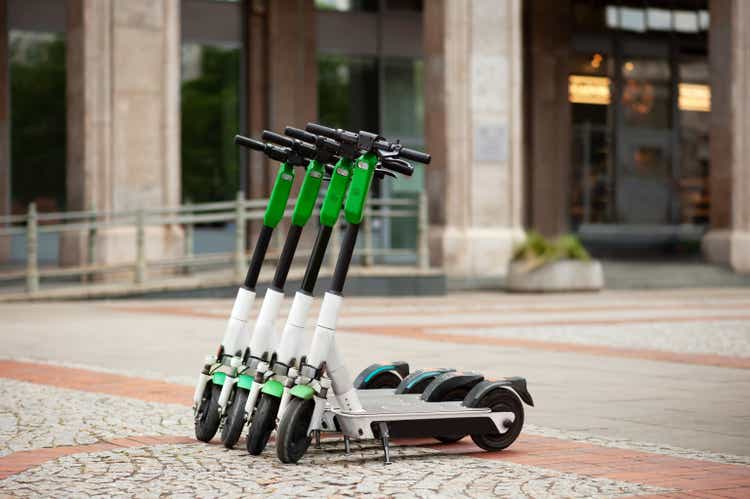Liudmila Chernetska/iStock via Getty Images
When electric scooter maker Niu Technologies (NASDAQ:NIU) offered a preview of its fourth-quarter sales volume earlier this month, it highlighted that the latest strategies to boost its domestic and international business fared well in the period, despite a disappointing end to the year overall.
Its growing focus on “mass-premium” products in its home China market showed significant progress, it said, with unit sales of such products increasing to 75% of its total in last year’s fourth quarter from 39% a year earlier.
Meantime on the international front, the company has been working to increase offline sales. It made progress on that front, as 80% of its overseas sales came from traditional brick-and-mortar retailers like BestBuy in the U.S. and MediaMarkt in Europe in last year’s fourth quarter, up sharply from 46% in the same period of 2022.
Despite that progress, Niu’s overall China sales fell 6.4% to 110,454 units in the fourth quarter from 118,065 a year earlier. That was mostly offset by a 34% rise in its international sales to 27,022 units, producing an overall decline of about 0.6% for the quarter in terms of unit sales.
The mixed bag of news initially cheered investors, with Niu’s shares rising 2.4% the day after the announcement, only to give back all the gains and more in the following days. Year-to-date Niu’s shares are already down by 18%, tracking U.S.-listed Chinese stocks that are dropping rapidly over investor concerns about the slumping domestic economy.
Niu’s one-year decline is even worse, with the stock down by nearly two-thirds. During the company’s third-quarter earnings call in November, CFO Fion Zhou forecast the company would report 490 million yuan ($68.7 million) to 612 million yuan in fourth-quarter revenue, representing a 20% year-over-year decrease at the low end to flat at the high end. The company has yet to release final fourth-quarter results, and will likely do so in March.
So, what’s going on with China’s top lithium-battery electric scooter maker? It previously reported a third-quarter loss of 80 million yuan, reversing a 3 million yuan profit in the same period of 2022, as its revenue fell by a fifth to 927 million yuan from 1.15 billion yuan.
The sagging sales come as Chinese consumers become increasingly cautious, especially for more expensive big-ticket items, with the economy still facing “headwinds,” as President Xi Jinping acknowledged in his New Year’s address. But the craze for electric scooters that revved up in China a decade ago, and later took off in the rest of the world, is also showing signs of hitting the brakes.
Chinese subsidies for electric vehicles (EVs) dating back as early as 2009 began to wind down at the beginning of 2023. While those subsidies are targeted at more traditional cars and not two-wheeled vehicles, the signals of fading government support may still be affecting consumer sentiment for e-scooters as well, particularly for Niu’s focus on the premium end of the market.
European blues
Meantime overseas, the European market, which accounted for 59% of Niu’s international sales in 2022, has been turning against electric scooters over the past year as a result of fatalities and urban clutter. Paris became the first European city to ban shared electric scooters last September, five years after being one of the first to adopt them. Britain banned e-scooters on many trains and platforms in June, and almost half of respondents in a survey by the German Press Agency, DPA, around the same time wanted them banned. E-scooters are already illegal in the Netherlands.
Europe’s growing anti-scooter movement has taken a toll on local giant Piaggio (OTCPK:PIAGF) (OTC:PGGCY) (PIA.MI), which makes the iconic Vespa moped but has also introduced an e-scooter, the Piaggio1. The Italian company’s shares cratered around the time that Paris announced its scooter ban. Shares of Ninebot (689009.SS), which owns the equally iconic Segway scooter, are also down over the past year.
As the European bans took hold, Niu’s overseas sales tumbled by 38% to 35,468 units in the third quarter, while sales volume in China decreased by a more modest 12% to 230,455 units.
CEO Li Yan said Niu has been countering its overseas sales slump by trying to expand sales beyond its traditional moped-style scooters in Europe and North America. Its new products include a high-end electric motorcycle, the RQi, with a top speed of 110 kph and a zero-to-50 kph acceleration time of 2.9 seconds. It has also rolled out an off-road motorcycle product, the XQi3 electric dirt bike. In Southeast Asia, it has introduced battery-swapping solutions for users of its mopeds looking for a quick charge.
In China, which accounts for the bulk of Niu’s sales, the company blamed its sagging fortunes on sluggish consumption in top-tier cities. It is seeking to counter that with products like its newer Falcon series, which accounted for more than 50% of total sales in the quarter. The F400T electric bicycle from the series takes its inspiration from fighter jets, Li said, with a maximum range of 90 km.
On the positive side, Niu has also maintained solid cash flow, ending the third quarter with 1.4 billion yuan in cash and short-term investments. Its operating cash flow fell to 229 million yuan compared to 415 million yuan a year earlier but was up slightly from 217 million yuan in the second quarter of 2023.
With a price-to-sales (P/S) ratio of 0.38, Niu trades at a similar valuation to rival Luyuan (2451.HK), which was listed in Hong Kong last October and has a ratio of 0.5. The six analysts canvassed by Yahoo Finance continue to bet Niu will charge back to profits eventually, with the group giving it an average recommendation of 2.2, on a scale where 1 indicates “strong buy” and 5 indicates “sell.” But that charge may take a little longer than impatient investors or the company would like.
Disclosure: None
Editor’s Note: The summary bullets for this article were chosen by Seeking Alpha editors.



